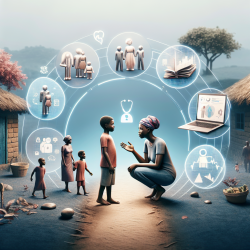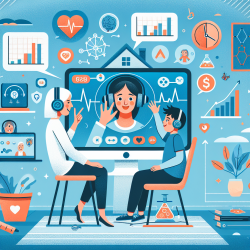Introduction
In the wake of the COVID-19 pandemic, the landscape of healthcare and education has undergone significant transformations. One area that has seen remarkable innovation is youth social innovation, particularly in low- and middle-income countries like the Philippines. The research article titled "Youth social innovation during the COVID-19 pandemic in the Philippines: a quantitative and qualitative descriptive analyses from a crowdsourcing open call and online hackathon" provides a comprehensive analysis of how Filipino youth have contributed to addressing pandemic-related challenges through innovative solutions. This blog post explores how practitioners, particularly those involved in online therapy services for children, can leverage these insights to enhance their practice.
Key Findings from the Research
The study conducted a crowdsourcing open call and an online hackathon to engage Filipino youth aged 15-30 in developing solutions for pandemic-related challenges. The open call received 113 entries, categorized into three main areas: youth voices to cocreate the post-COVID-19 world, youth-led COVID-19 social innovations, and youth-led social innovations not related to COVID-19. Notably, 12 entries focused on youth mental health during the pandemic, highlighting the critical need for mental health interventions.
The hackathon provided mentorship to participants, enabling them to refine their ideas into actionable health communication campaigns and social innovations. The study concluded that youth voices are essential in strategic planning processes, and a global youth social innovation call is recommended to further harness this potential.
Implications for Practitioners in Online Therapy
For practitioners involved in online therapy services for children, the findings of this study offer several actionable insights:
- Incorporating Youth Perspectives: The research underscores the importance of including youth voices in developing solutions for health challenges. Practitioners can adopt a similar approach by actively involving children and adolescents in the design and evaluation of therapy programs. This can lead to more tailored and effective interventions.
- Focus on Mental Health: The emphasis on mental health in the study aligns with the increasing recognition of mental health challenges among children during the pandemic. Online therapy services can prioritize mental health support, offering specialized programs that address anxiety, depression, and social isolation.
- Utilizing Innovative Platforms: The success of the online hackathon demonstrates the potential of digital platforms for engaging youth in meaningful ways. Online therapy practitioners can explore similar digital tools and platforms to enhance engagement and participation among young clients.
- Collaboration and Mentorship: The mentorship provided during the hackathon was crucial in refining youth innovations. Practitioners can establish mentorship programs where experienced therapists guide young clients, fostering a supportive environment that encourages growth and development.
Encouraging Further Research
The study opens avenues for further research into the role of youth in social innovation, particularly in the context of online therapy. Practitioners are encouraged to conduct research that explores:
- The effectiveness of youth-led innovations in improving therapy outcomes.
- Strategies for integrating youth perspectives into therapy program design.
- The impact of digital platforms on engagement and therapy effectiveness.
Conclusion
The research on youth social innovation during the COVID-19 pandemic provides valuable insights for practitioners in online therapy services. By incorporating youth perspectives, focusing on mental health, utilizing innovative platforms, and fostering collaboration, practitioners can enhance therapy outcomes for children. As we continue to navigate the post-pandemic world, the inclusion of youth voices in strategic planning and innovation will be crucial in addressing emerging challenges.
To read the original research paper, please follow this link: Youth social innovation during the COVID-19 pandemic in the Philippines: a quantitative and qualitative descriptive analyses from a crowdsourcing open call and online hackathon.










